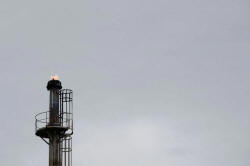Oil rises as fighting escalates in Iraq's oil-rich
Kirkuk
 Send a link to a friend
Send a link to a friend
 [October 16, 2017]
By Libby George [October 16, 2017]
By Libby George
LONDON (Reuters) - Oil markets jumped on
Monday as Iraqi forces entered the oil city of Kirkuk, taking territory
from Kurdish fighters and raising concerns over exports from OPEC's
second-largest producer.
Iraq launched the operation in the multi-ethnic region on Sunday as the
crisis between Baghdad and the Kurdish Regional Government (KRG)
escalated. Tensions have been building since the KRG voted for
independence in a Sept. 25 referendum.
Brent crude futures <LCOc1> were at $58.10 per barrel at 1053 GMT, up 93
cents from the previous close. U.S. WTI crude was at $52.14 per barrel,
up 69 cents.
"The escalation in Northern Iraq is the main driver," Commerzbank
analyst Carsten Fritsch told the Reuters Global Oil Forum. "Oil supply
from this region is at risk."
The government said its troops had seized Kirkuk airport and taken
control of Iraq's North Oil Company. While an Iraqi oil ministry
official said oil and gas production in Kirkuk was "proceeding
normally", and that Kurdish leaders had agreed to avoid fighting in oil
and gas facilities, the action unsettled the market.

Kirkuk accounts for 200,000 barrels per day (bpd) of the some 600,000
bpd of oil produced in the KRG region, and Turkey has threatened to shut
a KRG-operated pipeline that goes to the Turkish port of Ceyhan at
Baghdad's request.
Renewed worries over U.S. sanctions against Iran also drew attention in
the market.
U.S. President Donald Trump on Friday refused to certify that Tehran is
complying with the accord even though international inspectors say it
is.
[to top of second column] |

Flames are seen coming from a burn off valve at the American
Refining Group, Inc., (ARG) the oldest continuously operated
refinery in the United States founded in 1881, in Bradford,
Pennsylvania, U.S. October 6, 2017. REUTERS/Brendan McDermid

Under U.S. law, the president must certify every 90 days that Iran is complying
with the deal. Congress now has 60 days to decide whether to reimpose economic
sanctions on Tehran.
During the previous round of sanctions, roughly 1 million bpd of Iranian oil was
cut off. Analysts said that while renewed sanctions were unlikely to curtail
that level of exports again, they warned that such a move would be disruptive.
U.S. OIL RIG EXPLOSION
Cuts to U.S. drilling rigs, and an explosion overnight at an oil rig in
Louisiana's Lake Pontchartrain, also boosted prices.
Drillers cut five oil rigs in the week to Oct. 13, bringing the total count to
743, the lowest since early June, Baker Hughes <GE.N> energy services firm said
late on Friday. <RIG-OL-USA-BHI>
Oil consumption has also been strong, especially in China, where the central
bank governor said on Monday that the economy is expected to grow by 7 percent
in the second half of this year, defying widespread expectations for a slowdown.
(Additional reporting by Henning Gloystein in Singapore; editing by Jason Neely)
[© 2017 Thomson Reuters. All rights
reserved.] Copyright 2017 Reuters. All rights reserved. This material may not be published,
broadcast, rewritten or redistributed. |